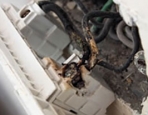Need to know how much a home rewire will cost? The short answer is probably somewhere between $3,000 and $9,000 or more. It’s clear from the wide variation in prices that there are a number of factors that can determine exactly how much your domestic rewire is going to cost you.
We understand that from wanting to know the cost of a total rewire through to needing information on average home rewiring prices to check a competitive quote, there are many reasons why homeowners want a greater understanding of rewiring costs.
We’ve put together a comprehensive guide that covers everything you need to know about rewiring your home. Our guide includes:
- A description of warning signs that could mean your home desperately needs a rewire.
- The benefits of rewiring.
- Consideration of what tasks make up a rewire.
- Variables that could affect the price of a home rewiring job.
- How to choose an electrician that will deliver the results you want for a competitive price.
What is Rewiring?
Obviously, every home that has an electricity supply will have some means of ensuring electricity is transported to the various rooms in the home and is available in an accessible format (sockets, lighting fixtures etc). There also needs to be protection in place to prevent surges and reduce the risk of electricity travelling where it’s not meant to go. A number of different tasks make up the rewiring job (see below), but at its most basic, rewiring involves replacing existing electrical cabling, outlets and panels with new ones.
Signs Your Home Could Need Rewiring
We recommend that you have your wiring inspected every five years. A regular inspection minimises the risk of unsafe electrical installations developing. It also gives your electrician an opportunity to ensure compliance with current wiring regulations and suggest any rewiring work that’s necessary to enable your electrical system to meet the demands of the 21st Century.
In addition, if you spot one or more of the following, it’s best to seek professional advice promptly. A trained electrician can accurately diagnose what the problem might be, then suggest suitable remedial action.
Signs to look out for include:
- Frayed electrical cables.
- Flickering lights.
- Bulbs blowing frequently.
- Loose or broken sockets.
- Exposed wiring.
- Small electric shocks (!) when you use switches or electrical appliances.
- Appliances that trip the mains switch.
- Strange burning smells.
- Crackling, sparking or buzzing.
- The area near an electrical outlet appears burned or changed in appearance.
If you live in an older home and haven’t had an electrical inspection in the last five years, we strongly recommend that you schedule one. Even if your home has no signs of deterioration in the wiring, it could still be dangerous.
The Benefits of Rewiring
There are numerous advantages to ensuring your wiring is in top condition. Some of these are:
- New wiring complies with the very latest safety requirements. A rewired house is a safe house.
- Fresh wiring helps to protect your appliances from power surges or outages. This can prolong their life and reduce the need for ongoing repairs.
- Tailor your home to suit your needs. If you require extra sockets or lighting in a fresh location, your wiring upgrade is a great opportunity to get the work done.
- Equip your home for the 21st Century. We are using more electrical gadgets than ever before, which puts more stress on your wiring. Modern demands for electricity require a robust, high-grade wiring system that’s capable of delivering safe, consistent power.
- Increase the value of your home. High-quality, compliant wiring is an indication that your home is safe to live in, which is always a consideration for buyers. In addition, because a rewire can be quite disruptive, many buyers are delighted to find that the task has already been completed before they take ownership.
What Tasks Make up a Rewire (Alongside Indicative Prices)
A total rewire involves the following:
- Installing a fresh switchboard and meter box, along with appropriate cabling.
- Replacing all cabling.
- Fitting fresh back boxes to switches and sockets.
- Adding in any new sockets of switches. Installing automated technology and other hi-tech electrical installations if required.
- Rewiring lighting fixtures.
- Replacing or installing fixtures for TV and broadband.
Given below are a list of the tasks that could be involved in a total rewire, along with an average price as of 2021:
- Repairing or replacing a meter box – $250
- Rewiring light sockets – $100
- Rewiring an inverter – $90
- Repairing or replacing a faulty cable – $120
- New switchboard cabling – somewhere between $1,800 and $3,200.
- Copper wiring – around $600 – $650.
- Fresh switchboard – about $1000
- Fitting a single light fitting or socket – $70 – $120.
The exact cost will depend (among) other things, on the work that your electrician recommends, as well as any additions or specific work that you want carried out. For example, installing the electrics in a new-build property will involve a new switchboard, meter, cabling and socket/lighting fixture installation, which is a comprehensive set of tasks. That said, in a new property there will be no need to strip out old wiring, meaning that labour costs will be lower.
It’s also worth remembering that many electricians will offer a discount on individual tasks if they’re part of a larger, total rewiring project. We recommend comparing quotes between several local electricians, to see which one offers the best price.
A Partial Rewire Could be Suitable
In some circumstances, it’s not necessary to complete a total rewire. Usually, rewiring is recommended following an electrical inspection. During an electrical inspection, the electrician completes a standard set of checks on each aspect of the wiring and circuitry in your home. The information from these checks determines:
- Which parts of the wiring system need to be replaced on safety grounds.
- Which parts of the wiring should be replaced in order to bring the circuitry up-to-date.
- Any additional improvements that could be made.
Whilst in some cases a complete rewire is recommended, in many others, there may not be a need for every part of the system to be replaced. In these circumstances, a partial rewire may be preferable. If cost is an issue, you may wish to get only those pieces of work done that are necessary for the safe functioning of your system. Your electrician can usually suggest ways of staging the work, enabling the cost to be staggered if necessary.
Variables that can Affect Your Rewiring Price
There is a range of variables that can influence rewiring price. Some of these are detailed below:
Size of your home
It goes without saying that a larger home will cost more to rewire than a bijou dwelling.
Age of the property
Older properties tend to have outdated wiring that has a higher chance of being unsafe. In addition, installation can present challenges – the risk of disturbing asbestos during a rewire can be an issue, for example.
Location
Prices vary by state: homeowners in Western Australia, for example, can expect to pay somewhere between $85 – $110 per hour for an electrician. At the other end of the scale, residents of NSW can expect to pay as low as $35 an hour. The average costs per hour for an electrician by state are:
- NSW $35 – $80
- Western Australia – $86
- Tasmania – $79
- Queensland – $70
- Victoria – $65
- Southern Australia – $75
How much work is involved in accessing the wiring
This can be a particular issue in older properties, where power may have been installed in different parts of the property at different times, or subsequent remodelling may have made some areas inaccessible.
Whether the rewiring is part of a larger remodelling job or a standalone project
In some circumstances, it can be cheaper to rewire at the same time as remodelling, as walls won’t be in a finished state, so wiring can more easily be installed.
For most homeowners, the most straightforward way to obtain an accurate rewiring price is to get an electrical inspection done. Armed with the results of the inspection, it should then be possible to get quotes from a number of local electricians to complete the required work. This is often the best way to find out what the going rate is in your neighbourhood.
Be aware that in most cases, prices will be roughly comparable between local tradies. If you find one that charges much more, or much less, than the average, it’s worth asking yourself why. It could be the case that a cheaper quote excludes work you want completing. Conversely, a more expensive quote may mean that unnecessary work is included.
How to Find a Suitable Electrician
If you discover that your home does need rewiring work completing, it’s essential to use a suitably qualified tradie to get the work done. Completing many aspects of rewiring work on a DIY basis is illegal. Aside from the legalities, DIY wiring can be extremely dangerous. Why risk it? Follow these simple considerations to make sure you end up with a professional who’s ideally qualified to complete the work.
Check their experience
Ideally, your chosen electrician should have relevant experience in rewiring domestic properties. If it’s something they only do on an occasional basis, they may not have the experience you’re looking for. Find an electrician who regularly completes domestic rewiring, and who has up-to-date knowledge of what’s required.
Your electrician should be fully licensed
Their license number should be on their website, business card, or quote information. Licensing details are stored online in a searchable database, which means it’s easy to verify the license number.
Adequate insurance
Electricians should carry public liability insurance, as well as insurance against flawed workmanship.
Check their reputation
Most electricians will have online reviews of one sort or another. These can give valuable clues regarding whether they’re the best people to do business with. In general, we recommend using a local electrician. They will tend to have a verifiable local reputation. In addition, a well-established electrician is often a better choice. If an electrician has traded successfully for a few years and has the customer reviews to prove it, it’s likely they will do a good job on your rewiring project.
FREE, no-obligation quotes
Whilst an electrician will charge to carry out an inspection, they shouldn’t charge for quoting on the work needed to act on any recommendations arising from an inspection. Note that you don’t necessarily have to use the same electrician for carrying out an inspection as you do for carrying out rewiring work.
Compliance Certification
Once the work is complete, the electrician should issue you with a Compliance Certificate. This shows that the electrical work has been done in line with all relevant regulations and requirements. Should you come to sell the property in the future, this will show future buyers that your electrical work has been completed correctly.
Price is always a consideration, and there is no point in paying more than you need to. That said, remember to check quotes to see what’s included. Make sure that you are comparing like with like. A good electrician will answer any questions you may have about their quote, so don’t hesitate to query details you don’t understand or information you feel is missing.
Although rewiring can be disruptive whilst in progress, ultimately it can leave your home safer, improve the quality of your living experience and even increase the value of your property.
Get in touch to find out more about the benefits of rewiring your home.



